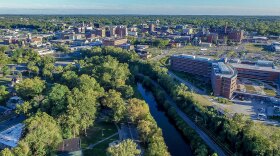Northeast Ohio is home to nearly 191,000 immigrants, including 97,000 in Cuyahoga County. Local immigration advocates say these groups are at risk of mass deportation under the incoming Trump administration, while Republicans say such concerns are unfounded.
Why are immigration advocates so concerned?
Joe Cimperman, president of Global Cleveland, a Northeast Ohio nonprofit, pointed to Donald Trump’s rhetoric on immigrants during the 2024 presidential election. He highlighted Trump’s perceived attacks on Haitian immigrants in Springfield, Ohio, including false allegations that they were stealing and eating residents’ pets.
“That was really part of this campaign — the untrue, hurtful, vicious, dishonest conversation around Springfield — the untruths about the burden, if you will, of what newcomers bring," Cimperman said.
Madhu Sharma, executive director of the International Institute of Akron, an immigrant social services agency, pointed to Trump’s actions during his last administration as cause for alarm.
“We've already been through four years under the Trump administration, where the largest raids in the history of the United States happened right here in Ohio," she said.
In June 2018, the Trump administration arrested 114 people during the raid of a flower and garden center in Sandusky, and another 146 during the raid of a meatpacking plant in Salem, Ohio. He has also pledged the “largest deportation operation in American history.”
Such a threat takes a toll on people, Sharma said, adding, “I just think there's a significant amount of fear."
How are Republican officials responding to concerns?
Rep. Josh Williams (R-Toledo) said Trump was right to focus on immigrants, including those in Springfield, but not because of unfounded rumors about eating pets. Instead, the influx of immigrants was so large that it overwhelmed the city's infrastructure and harmed its economy, he said.
"The real concern was that you have a city of around 56,000 people getting inundated with 20,000 additional people over a two-year period,” Williams said, adding that this led to housing issues, overwhelmed schools and crime.
David Arredondo, former Lorain County Republican Party chair, said he does not believe there will be mass deportation.
“What I do see is that those who are criminals who are maybe under temporary protected status will, in fact, be the first ones that will be targeted," Arredondo said.
Has Trump said anything beyond deporting criminals?
Trump did promise to revoke Temporary Protected Status of Haitian immigrants in Springfield, but Arredondo dismissed such talk as political talking points meant to drive voters to the polls.
“It really was rhetoric," he said. "But what you see in campaigns and what you see that happens afterwards are two different things.”
How are advocacy groups preparing?
Sharma said her organization will focus on legal services to help protect new immigrants.
“We'll be shifting a lot of our work to legal defense services, but we'll also be helping counsel people who might need to gain some access to stabilize their legal status in the United States,” she said.
Cimperman said a symposium he held last week focusing on post-election legal strategies was a good first step to prepare for what's coming.
"The whole purpose of this is to get people in the room talking to each other, understanding what the realities are here in Northeast Ohio and figuring out, as we do best, how do we stand with them for one another," he said.
Is there a way to change the dialogue on immigration in a more positive direction?
Americans need to recognize the benefits that immigrants represent, Cimperman said.
“I talk to factory owners every single day that are looking for workers. They hire international newcomers. They hire immigrants. They see the benefit," he said.
Recent research appears to back up his claims. A Dec. 2 Policy Matters Ohio report found immigrant workers and business owners generate $53 billion in economic output.
Immigrants also play a central role in keeping the health care system running effectively, especially in rural locations where there are fewer physicians, Cimperman said.
“The health care in parts of the state of Ohio are so fragile," he said. "American-born people don't want to work in those places. Who's going to take care of the people that are taking care of America?"
What do Republican officials say about arguments?
Arredondo agreed that immigrants play a pivotal role in the local economy and health care system, but said he believes the current visa system already provides a way for immigrants to stay in America.
“If these are the so-called good people that we feel so good about, then they should have no trouble getting a visa," Arredondo said.
Williams agreed.
"Doctors and nurses that have degrees are not the ones asking for parole out of Haiti, because there's already visas for them because they have specialized careers," he said.







